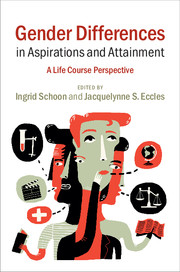Book contents
- Frontmatter
- Contents
- List of Figures
- List of Tables
- Notes on Contributors
- List of Abbreviations (selected)
- Part I Introduction
- Part II The early school years
- 1 Peer influences on gender differences in educational aspiration and attainment
- 2 Beginning school transition and academic achievement in mid-elementary school
- 3 Gender differences in teachers’ perceptions and children’s ability self-concepts
- 4 Emerging gender differences in times of multiple transitions
- Part III Career planning during adolescence
- Part IV Choosing a science career
- Part V Longer-term consequences of early experiences
- Part VI The role of context
- Index
- References
3 - Gender differences in teachers’ perceptions and children’s ability self-concepts
Published online by Cambridge University Press: 05 October 2014
- Frontmatter
- Contents
- List of Figures
- List of Tables
- Notes on Contributors
- List of Abbreviations (selected)
- Part I Introduction
- Part II The early school years
- 1 Peer influences on gender differences in educational aspiration and attainment
- 2 Beginning school transition and academic achievement in mid-elementary school
- 3 Gender differences in teachers’ perceptions and children’s ability self-concepts
- 4 Emerging gender differences in times of multiple transitions
- Part III Career planning during adolescence
- Part IV Choosing a science career
- Part V Longer-term consequences of early experiences
- Part VI The role of context
- Index
- References
Summary
Abstract
The aim of the present study is to investigate the associations between primary school teachers’ perceptions of ability and effort and children’s ability self-concepts and performance in math and reading. Moreover, special focus is put on the possible gender differences in teachers’ ability and effort perceptions. The study uses data from the Childhood and Beyond (CAB) Study in which three cohorts of elementary school children and their teachers were followed. The sample includes 849 children (240 second-graders, 246 third-graders, and 363 fifth-graders) and their teachers. Information concerning children’s ability self-concepts and actual performance in math and reading was gathered during the spring term. Teachers rated the children’s ability and effort at the same time. The results show, first, that teachers’ perceptions of ability and effort positively predict children’s ability self-concepts in math and reading. Moreover, gender differences are found in teachers’ perceptions: teachers tend to rate boys as having higher abilities in math than girls, and they tend to rate girls as putting more effort into reading than boys.
- Type
- Chapter
- Information
- Gender Differences in Aspirations and AttainmentA Life Course Perspective, pp. 79 - 100Publisher: Cambridge University PressPrint publication year: 2014
References
- 6
- Cited by



